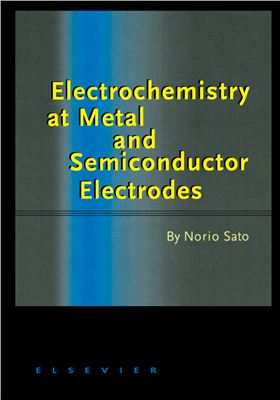Elsevier Science, 1998, Pages: 400
Electrochemisty at Metal and Semiconductor Electrodes covers the structure of the electrical double layer and charge transfer reactions across the electrode/electrolyte interface. The purpose of the book is to integrate mode electrochemistry and semiconductor physics, thereby, providing a quantitative basis for understanding electrochemistry at metal and semiconductor electrodes. Electrons and ions are the principal particles which play the main role in electrochemistry. This text, therefore, emphasizes the energy level concepts of electrons and ions rather than the phenomenological thermodynamic and kinetic concepts on which most of the classical electrochemistry texts are based. This rationalization of the phenomenological concepts in terms of the physics of semiconductors should enable readers to develop more atomistic and quantitative insights into processes that occur at electrodes.
The book incorporates many traditional disciplines of science and engineering such as interfacial chemistry, biochemistry, enzyme chemistry, membrane chemistry, metallurgy, modification of solid interfaces, and materials' corrosion. The text is intended to serve as an introduction for the study of advanced electrochemistry at electrodes and is aimed towards graduates and senior undergraduates studying materials and interfacial chemistry or those beginning research work in the field of electrochemistry.
Electrochemisty at Metal and Semiconductor Electrodes covers the structure of the electrical double layer and charge transfer reactions across the electrode/electrolyte interface. The purpose of the book is to integrate mode electrochemistry and semiconductor physics, thereby, providing a quantitative basis for understanding electrochemistry at metal and semiconductor electrodes. Electrons and ions are the principal particles which play the main role in electrochemistry. This text, therefore, emphasizes the energy level concepts of electrons and ions rather than the phenomenological thermodynamic and kinetic concepts on which most of the classical electrochemistry texts are based. This rationalization of the phenomenological concepts in terms of the physics of semiconductors should enable readers to develop more atomistic and quantitative insights into processes that occur at electrodes.
The book incorporates many traditional disciplines of science and engineering such as interfacial chemistry, biochemistry, enzyme chemistry, membrane chemistry, metallurgy, modification of solid interfaces, and materials' corrosion. The text is intended to serve as an introduction for the study of advanced electrochemistry at electrodes and is aimed towards graduates and senior undergraduates studying materials and interfacial chemistry or those beginning research work in the field of electrochemistry.

